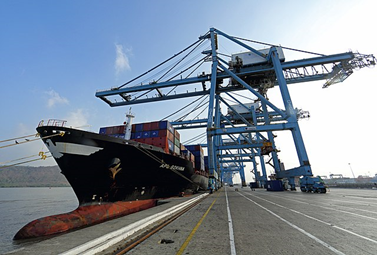

22nd November 2022 (6 Topics)
Context
The Union Minister of Ports, Shipping & Waterways (MoPSW) has launched India’s first Centre of Excellence for Green Port & Shipping to provide Green solutions to transform India's Ports & Shipping sector.
About
The National Centre of Excellence for Green Port & Shipping (NCoEGPS):
- Aim: To develop a regulatory framework and alternate technology adoption roadmap for Green Shipping to foster carbon neutrality and circular economy (CE) in the shipping sector in India.
|
Circular Economy: A circular economy is a model of production and consumption, which involves sharing, leasing, reusing, repairing, refurbishing, and recycling existing materials and products for as long as possible. |
- NCoEGPS will act as a technological arm of MoPSW for providing the needed support on Policy, Research, and Cooperation on Green Shipping areas for Ports, DG Shipping, Corporate Social Lending, and other institutions.
- The Center will be a host of several technological arms to support the port and shipping sector and will provide solutions to a variety of problems being faced in the industry through scientific research.
- It will also carry out valuable education, applied for research, and technology transfer in maritime transportation at the local, regional, national, and International levels.
- It will focus on the following areas:
- Energy Management - Energy management tools, waste energy recovery systems
- Emission Management- Alternate, Clean Energy/Fuel, emission control & monitoring.
- Sustainable Maritime Operations – novel technologies and approaches
The specific objectives of the formation of NCoEGPS are defined as follows -
- To empower ‘Make in India’ in Port, Coastal, and Inland water transport, and Engineering by developing state-of-the-art technologies and application products.
- To enable fast-track innovations in order to provide the most appropriate solutions to various challenges in these sectors.
- To create a pool of competent manpower in the industry equipped with state-of-the-art theoretical and practical know-how.
- Self-sufficiency in providing short-term solutions through scientific studies technology development technical arm in identifying and analyzing complex problems and solving issues
Project Implementation:
- The Energy and Resources Institute (TERI) is the knowledge and implementation partner for this project.
- The Deendayal Port Authority Kandla, Paradip Port Authority, Paradip, V.O Chidambaranar Port Authority, Thoothukudi, and Cochin Shipyard Limited, Kochi has all extended their support to the ministry to set up the center.
- The ports have also aimed to reduce Carbon emissions per ton of cargo handled by 30% by 2030.
- India will also be implementing IMO energy efficiency requirements for existing ships and carbon intensity requirements on all its vessels whether coastal or international in order to help achieve IMO GHG reduction targets.
- The NCoEGPS will be working under the framework of the Sagarmala program of the MoPSW.
Significance:
- Help to achieve Inclusive growth: The shipping sector which is both energy and resource intensive also needs an implementation roadmap to gain energy and resource neutrality. Therefore, the work undertaken by the NCoEGPS will provide the decision makers at a national and sub-national level with methodology and framework to implement carbon neutrality measures.
- Fulfilling the Paris accord: It will also help to meet (and exceed) obligations under the Paris Accord through the electrification of processes, renewable energy, carbon capture and storage, and other emerging alternate fuel technologies including green fuels.
- Improve Training and Capacity Building: The scope of work carried out by NCoEGPS will also include training and capacity of different stakeholders for fast-tracking the adoption of green measures identified through research.
Other Government Initiatives:
- The Maritime Vision Document 2030, released is a 10 Year blueprint of India’s vision of a sustainable Maritime sector and vibrant blue economy.
- India’s Nationally Determined Contributions (NDC) under the Paris Agreement for the Period 2021-2030 include reducing the emissions intensity of its GDP by 33 to 35 percent by 2030 from the 2005 level and achieving about 40 percent cumulative electric power installed capacity from non-fossil fuel-based energy resources by 2030 with the help of the transfer of technology and low-cost international finance.


